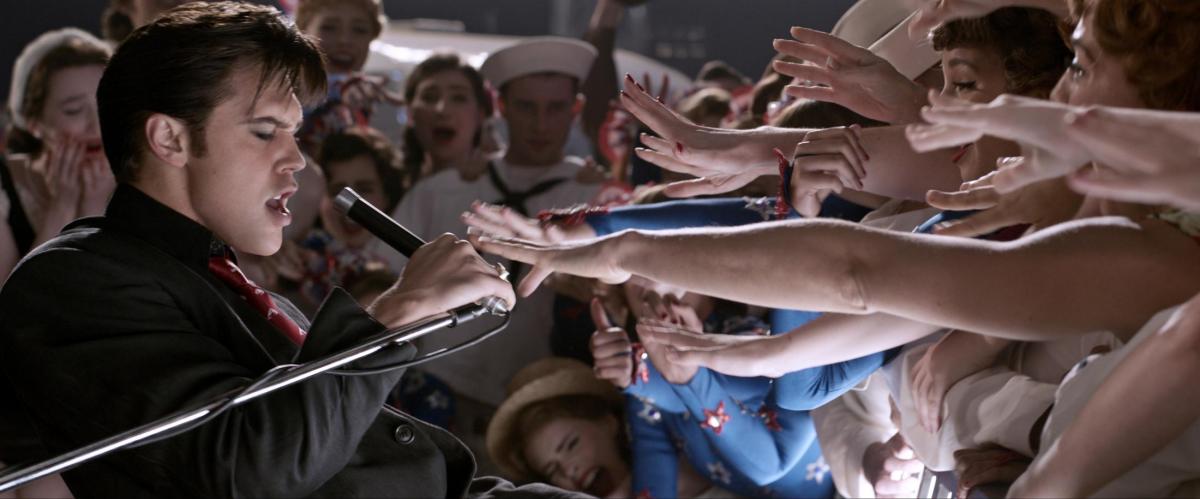
I’m guessing that filmmaker Baz Luhrmann is not a big fan of Coco Chanel. The designer famously suggested looking in the mirror and removing one accessory. Luhrmann is all about adding things—more color, more music, more elaborate sets, more show girls (often literally)! Are his films tacky? Coco would certainly think so.
As you may have picked up, I’m not the biggest Luhrmann fan. Even his most beloved film, Moulin Rouge, was not my cup of absinthe. (I found the insertion of the all the pop songs irritating and fan-servicey and thought that Nicole Kidman, an actress I normally love, was a bit too coolly elegant to play a bombshell.) And his latest, Elvis, has all the hallmarks of a Luhrmann film. Virtually every scene—and I’m not exaggerating here—is a montage, often layering Elvis on stage with a scene from his youth, where he was transfixed by Black gospel music in a revivalist tent, with a glimpse at an unrelated blues nightclub and a press conference where a grim politician condemns Elvis’ hip-shaking debauchery. Each of these scenes is shot with a different filter, of course. And they are often repeated. (In case you missed young Elvis reaching nirvana in that revival tent—fear not, it will return several times.) There are show-offy fades—from a ferris wheel to a spinning record, for example. There is lots of wonderful and period appropriate music—blues, rock, and gospel—but there’s hip-hop, too, because, well, Luhrmann.
And yet, despite this, almost astonishingly, I liked Elvis. Part of my appreciation simply has to do with the all-in performance by Austin Butler. Elvis is, of course, a dream role for a young actor—but it’s also a trap. There are so many Elvis impersonators out there, how do you break through the mimicry, distinguish yourself from the lip-curling masses? Butler did it by going full method—and displaying some pretty impressive singing (and hip-swiveling) chops along the way. Clearly the young actor bought into Baz’s swirling, sweaty, maximalist vision—and his commitment to the part is astonishing. He’s got the voice (multiple voices, actually—Elvis’ voice got raspier and deeper as he aged), the looks, the moves, and even Elvis’ sneaky, flashing grin. I didn’t think the slender, pretty actor was going to be able to pull off “Fat Elvis,” as it were, but with a lot of help from makeup and wardrobe (and buckets of artificial sweat, apparently), he’s surprisingly successful.
Tom Hanks, of all people, is less successful as Colonel Tom Parker, the Dutch, Svengali-like conman/entrepreneur who managed Elvis and exploited the Memphis singer until his dying day. Hanks has almost never given a bad performance—and while this one isn’t quite bad (lord knows Hanks swings for the fences), it’s not exactly good either. It doesn’t help that his Parker is buried under pounds of makeup and prosthetics or that Hanks’ Dutch accent, which might be accurate for all I know, sounds strange coming from his lips. But the real problem lies with Luhrmann. He sees Parker as such an unambiguous villain—a racist, a liar, an almost repulsive vulgarian—that Hanks isn’t able to bring much of his patented humanity to the part. I mean, maybe we’re supposed to believe that, despite lying to him, stealing from him, feeding him drugs, and trapping him in a gilded Vegas cage, Parker actually loved Elvis like a son. But it’s more suggested that he used the boy for his own gain.
Luhrmann depicts Elvis’ life as a tragedy—how could you not? He died of a drug-related heart attack at the age of 42. But he sees Parker as the engine of this tragedy—and envisions this story as a trip into Parker’s debauched underworld. Elvis, on the other hand, is seen as an Orpheus-like naif. A sweet-natured country boy who loved rock ‘n roll, his mama, and his wife, Priscilla, and who was unwittingly dragged into Parker’s hell.
Elvis is too long, too melodramatic, too everything. But it’s also often wildly entertaining—the performance scenes, busy as they are, are amazing feats of mimicry. There’s young Elvis thrusting his pelvis in a pink suit, making the teenage girls in the audience feel things they’ve never felt. There’s older Elvis, with mutton chops, in a studded leather jacket and cape. There’s Vegas Elvis doing an updated arrangement of his first hit, “That’s All Right”—grooving around the stage, barking riffs to the musicians, adding horns and back-up singers and a drum solo. It’s riveting stuff.
When you leave the theater, you’re a bit exhausted. You’re well aware that you’ve seen Elvis hagiography—and Parker demonization—not reality. But it can never be said you didn’t get your money’s worth. Sometimes more is more.
